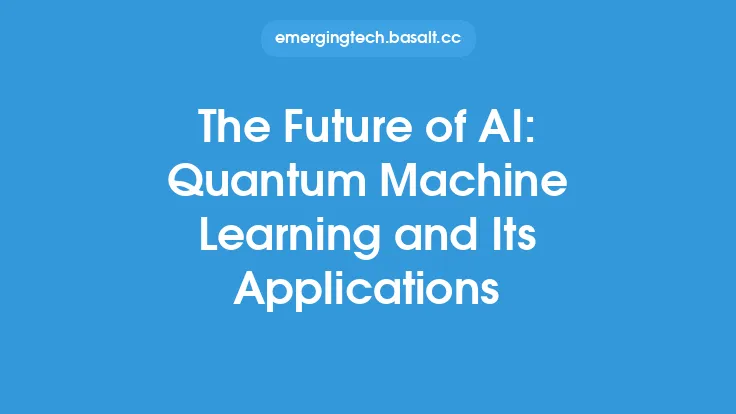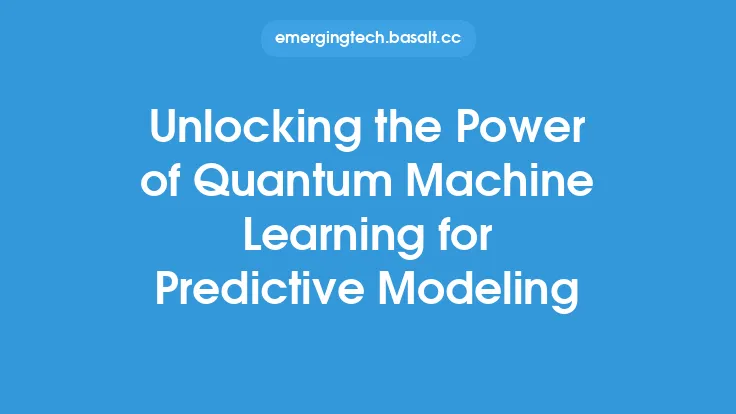The intersection of quantum computing and machine learning is a rapidly evolving field that has garnered significant attention in recent years. This convergence of two distinct disciplines has the potential to revolutionize the way we approach complex computational problems, enabling the development of more efficient and powerful algorithms. At its core, quantum machine learning (QML) seeks to leverage the principles of quantum mechanics to enhance the capabilities of machine learning models, leading to breakthroughs in areas such as pattern recognition, optimization, and prediction.
Introduction to Quantum Computing
Quantum computing is a paradigm that exploits the unique properties of quantum mechanics, such as superposition, entanglement, and interference, to perform computations that are beyond the capabilities of classical computers. Quantum computers use quantum bits or qubits, which can exist in multiple states simultaneously, allowing for the exploration of an exponentially large solution space in parallel. This property, known as quantum parallelism, has the potential to significantly speed up certain types of computations, making quantum computing an attractive platform for solving complex problems.
Introduction to Machine Learning
Machine learning is a subset of artificial intelligence that involves the development of algorithms and statistical models that enable machines to perform tasks without being explicitly programmed. Machine learning models can be broadly categorized into supervised, unsupervised, and reinforcement learning, each with its own strengths and weaknesses. These models rely on the availability of large datasets, which are used to train the models and enable them to make predictions or take actions. The increasing availability of data and advances in computational power have driven the rapid progress of machine learning in recent years.
Quantum Machine Learning Fundamentals
Quantum machine learning is an interdisciplinary field that seeks to combine the principles of quantum computing and machine learning to develop new algorithms and models that can be used to solve complex problems. QML algorithms can be broadly categorized into two types: quantum-assisted machine learning and quantum-native machine learning. Quantum-assisted machine learning involves the use of quantum computers to speed up certain components of machine learning algorithms, such as the computation of kernel matrices or the optimization of model parameters. Quantum-native machine learning, on the other hand, involves the development of machine learning models that are inherently quantum in nature, such as quantum neural networks or quantum support vector machines.
Quantum Algorithms for Machine Learning
Several quantum algorithms have been developed that can be used to speed up machine learning computations. One of the most well-known algorithms is the Quantum Approximate Optimization Algorithm (QAOA), which can be used to solve optimization problems that are common in machine learning. Another algorithm is the Quantum Circuit Learning (QCL) algorithm, which can be used to learn the parameters of a quantum circuit. The Harrow-Hassidim-Lloyd (HHL) algorithm is a quantum algorithm that can be used to solve systems of linear equations, which is a common problem in machine learning. These algorithms have the potential to significantly speed up certain types of machine learning computations, making them more efficient and scalable.
Quantum Machine Learning Models
Several quantum machine learning models have been developed, including quantum neural networks, quantum support vector machines, and quantum k-means clustering. Quantum neural networks are a type of neural network that uses quantum computing to speed up the computation of the network's weights and biases. Quantum support vector machines are a type of support vector machine that uses quantum computing to speed up the computation of the kernel matrix. Quantum k-means clustering is a type of clustering algorithm that uses quantum computing to speed up the computation of the cluster assignments. These models have the potential to be more powerful and efficient than their classical counterparts, enabling the solution of complex problems that are currently intractable.
Challenges and Limitations
Despite the significant potential of quantum machine learning, there are several challenges and limitations that must be addressed. One of the main challenges is the noise and error correction in quantum computers, which can quickly accumulate and destroy the fragile quantum states required for quantum computing. Another challenge is the limited number of qubits available in current quantum computers, which limits the size and complexity of the problems that can be solved. Additionally, the development of quantum machine learning algorithms and models requires a deep understanding of both quantum computing and machine learning, which can be a significant barrier to entry.
Future Directions
The future of quantum machine learning is exciting and rapidly evolving. As quantum computers become more powerful and widely available, we can expect to see significant advances in the development of quantum machine learning algorithms and models. One area of research that is likely to see significant progress is the development of quantum-native machine learning models, which are inherently quantum in nature. Another area of research is the application of quantum machine learning to real-world problems, such as image and speech recognition, natural language processing, and predictive modeling. As the field continues to evolve, we can expect to see significant breakthroughs and innovations that will enable the solution of complex problems that are currently intractable.
Conclusion
The intersection of quantum computing and machine learning is a rapidly evolving field that has the potential to revolutionize the way we approach complex computational problems. Quantum machine learning algorithms and models have the potential to be more powerful and efficient than their classical counterparts, enabling the solution of complex problems that are currently intractable. While there are several challenges and limitations that must be addressed, the future of quantum machine learning is exciting and rapidly evolving. As quantum computers become more powerful and widely available, we can expect to see significant advances in the development of quantum machine learning algorithms and models, leading to breakthroughs in areas such as pattern recognition, optimization, and prediction.





